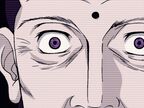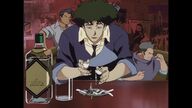Londes' story:
Londes preaches through television, or rather, television is the religion of Londes.
Before analyzing Londes, let's go to the climax of the finale and introduce it with a passage from Londes.
In the Abandoned Land, among the ruins, the Great Demon Lord Londes, composed of countless screens, asked Spike:
- Do you know why people believe in God? ——Because I want to believe.
- Do you know what is the best and worst thing that man has ever created? - is television. Television uses intelligence to control human beings and make human beings lose their sense of reality. ——Yes, TV is the religion now. TV uses boring series to create a group of people who are prone to credulity and delusions.
After saying these words that accurately pierced the spirit of the times, a sneer appeared on the corner of Londes' mouth, and Spike was also flustered by the interference of high-frequency radio waves.
In this episode, Watanabe actually has no intention to discuss the specific ideological core of a certain religion or cult (for example, the binary opposition of the soul and body promoted by the Scratch religion on TV at the beginning is only a setting and a foreshadowing, and there is not much discussion. ), and more through the mouth of Londes, to define the living soil of "religion" and "belief", that is, how "religion" and "belief" have survived in the long river of history, and now they have evolved into what form.
——It is not easy to live in this corrupt world. There is nothing to rely on in this world. --do you understand? It was not God who created man, but man who created God.
"Religion" and "belief" are the needs of human insecurity, and the electronic medium that is evolving at a high speed is the form of God today.
Londes and Scratch teach, referring to the medium itself. These human creations are now full of life all the time. The truth and the false are twisted into a twine on the screen, judging everyone's heart on the screen. Whether it’s images of provocative violence or ads oriented towards hypocrisy, it induces us to separate our desires from reality. To a certain extent, regardless of whether the content is true or false, as long as it appears in the "media", it is regarded as a kind of truth due to people's gullibility and blind obedience.
And truth, in turn, makes the "medium" God.
Whether God's name is called a TV or a mobile phone, they are all false antidote and non-existent dependence . Most of the stories of cyberpunk keep a deep thought and reflection on technology, but if the story ends here, then this episode is just a platitude and cautionary tale, and Watanabe's ambitions certainly don't stop there.
Cold guns are good, but withered roses are Watanabe's forte.
Rosny Spanngen's story:
Although this wonderful and sad story began to slowly emerge in the 18th minute, the four-minute reversal had to be convinced, and it made me cry.
It turns out that the great devil, Londes, is a created character, and the person who created him is a 13-year-old genius hacker who unfortunately turned into a vegetative state in a medical accident: Rosny Spanngen.
He was only 15 years old when he came up with this incident. In a vegetative state, he used scan lines to synthesize a phantom of the leader Londes and a sect, and deceived 20,000 believers. And not to mention Faye, Jet and Spike, even Ed couldn't track him down, he still had to rely on Ein's super-high IQ to finally find his whereabouts. I don't think he needs to go into details about the magnitude of his genius.
However, all this is only because fate played a huge joke on him, oh, vegetative, this poor soul must be asking over and over again why fate chose him.
With only a few lines spoken to Spike, Spanngen's arrogant side as Londes and the lonely and unwilling side of Spanngen as a 15-year-old come to the fore.
Take the big devil's rhetorical question
Spike: Like a child, the one who confuses fantasy with reality is yourself, Londones, if you want to dream, do it yourself!
Londes' voice: You...you know something, you don't know how I feel.
Spanngen is just a arrogant 15-year-old boy. In fact, it's not that Spike saw through Londes at a glance. It's just that people like Spike who face reality with scars on their backs naturally regard Londes' words as an escapee and a child's fantasy. But Spanngen had collapsed at this point. Because Ed and Jet are pulling him out of the network, he'll be alone again.
Londes and Spanngen's voices overlap: what...what are you doing Spanngen's voice: don't...help...can't do this...damn...please stop...please don't turn it off... I... what the hell did I do... nasty! This is not fair! Why is it just me? Damn...if everyone had the same body as me...well...damn...I don't want to disappear...don't want to disappear!
The boy's unwilling voice will go away, and Otsuka's holy singing will slowly sound off to send off the lonely soul. (The moment of tears comes the song link http://music.163.com/#/m/song?id=22767211&userid=44273387 Spanngen's monologue starts at 2:55) Seeing through the plight of human beings (insecurity, need of faith) ), and used it to do so many things, but because I was just an ordinary 15-year-old boy who couldn’t bear the loneliness that fate added to me, my teaching was to teach you to abandon your body, and it was only because I lost my My body, I am just a member of the predicament.
What looks like a demon king is just a skin that the boy puts on to dispel his fears, but the real demon king is called "reality".
At this moment, all CB members fully understood this lonely young man, because each of them also bears different but the same heavy fate and story.
At this moment, the handcuffs Jet put on him is actually his coming-of-age ceremony. After all, in the world of CB, facing all the gifts of fate is the romance of a man.
As he was handcuffed, Jet said, "No, you're not a teenager anymore, you're a great fraudster." Faye, who had just woken up, asked, "Where is this?" A meaningful smile: "It's all a child's dream." On the way out of the hospital, Jet's words just matched Spike's: "Yes, all he can do is dream." Ed finally looked back at the hospital and said with a sweet smile, "I hope you can have a good dream this time."
What a fucking romance!
In the world of cyberpunk, if Oshii Mamoru's "Ghost in the Shell" is a philosophical dialogue about soul and machinery, self-awareness, and technological reflection, then Watanabe Shinichiro's "Cowboy Bebop" is a dim bar There is an uncle who suddenly tells a story. This story is stripped of specific technical discussions and philosophical reflections. At the end, there is a romantic and heavy windbreaker, and a withering rose that fell in the rain.
PS: 1. Excluding op and ed, the 20-minute animation starts with Spike watching 4 minutes of TV, which includes news reports, current affairs reviews, live interviews, and commercials. 2. The final physical image of Londes is composed of countless screens, but what he said satirized the entire medium, especially ironic, there was a feeling that I was born to satirize my existence. 3. The screenwriter of this episode is Dai Sato, who also participated in the screenwriting of the 02 and 04 TV versions of Ghost in the Shell. 4.Londes' prototype is Marshall Applewhite, who founded the cult Heaven's Gate and led 39 believers to commit suicide collectively in California in 1997. A set of comparison pictures is attached.
View more about Cowboy Bebop reviews










